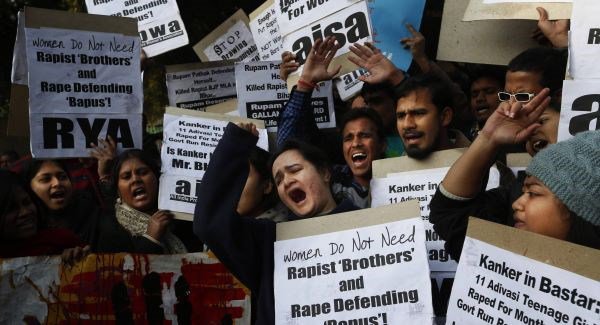-
Tips for becoming a good boxer - November 6, 2020
-
7 expert tips for making your hens night a memorable one - November 6, 2020
-
5 reasons to host your Christmas party on a cruise boat - November 6, 2020
-
What to do when you’re charged with a crime - November 6, 2020
-
Should you get one or multiple dogs? Here’s all you need to know - November 3, 2020
-
A Guide: How to Build Your Very Own Magic Mirror - February 14, 2019
-
Our Top Inspirational Baseball Stars - November 24, 2018
-
Five Tech Tools That Will Help You Turn Your Blog into a Business - November 24, 2018
-
How to Indulge on Vacation without Expanding Your Waist - November 9, 2018
-
5 Strategies for Businesses to Appeal to Today’s Increasingly Mobile-Crazed Customers - November 9, 2018
India lowers crime trial age to 16 after Delhi gang rape furore
On Tuesday, the Juvenile Justice Bill was passed by the Rajya Sabha – the upper house of the parliament.
Advertisement
The youth, who can not be named under Indian law as he was below 18 at the time of the attack, was released on Sunday after serving the maximum sentence of three years in a reform home.
The parents had led protests calling for the bill to be amended, labelling the existing law as too weak.
The changes to the law will allow minors aged 16-18 to be sentenced to at least seven years in young offenders’ institutions if convicted of “heinous crimes” including rape and murder.
The bill, which was passed by the lower house in May, had been listed for passage in the upper house during the ongoing winter session but proceedings have been hampered by perennial spats between the ruling Bharatiya Janata Party and opposition members. The death penalties have yet to be carried out.
The lowering of the age means that those aged 16 and above will no longer enjoy the protection under the Juvenile Justice law, under which juveniles can not be tried under normal laws of land that provides up to death for rape and murder.
Asha Devi and Badrinath, parents of the 23-year-old student were present in the visitors’ gallery as the Rajya Sabha took up the bill for discussion.
“Juvenile crime is the fastest rising segment in the country and the bill will help to stop (this)”, she said.
The mother of the victim, who met Minister of State for Parliamentary Affairs Mukhtar Abbas Naqvi in the morning, said if the bill had been passed earlier, the juvenile convict would not have walked free. Allaying members’ concerns over implications of the bill, Gandhi said it was “not against children but rather provides for, protects, nurtures and keeps them safe”.
However, the renewed law would not be used retrospectively, Indian media reported. Several other parties, including NCP, CPI (M) and DMK, had also pushed for sending the Bill to a Select Committee, arguing that further examination was required to decide whether the age for punitive action should be reduced to 16 years from the current 18 years.
Advertisement
“He would not have been released if this bill had been passed six months ago”.





























